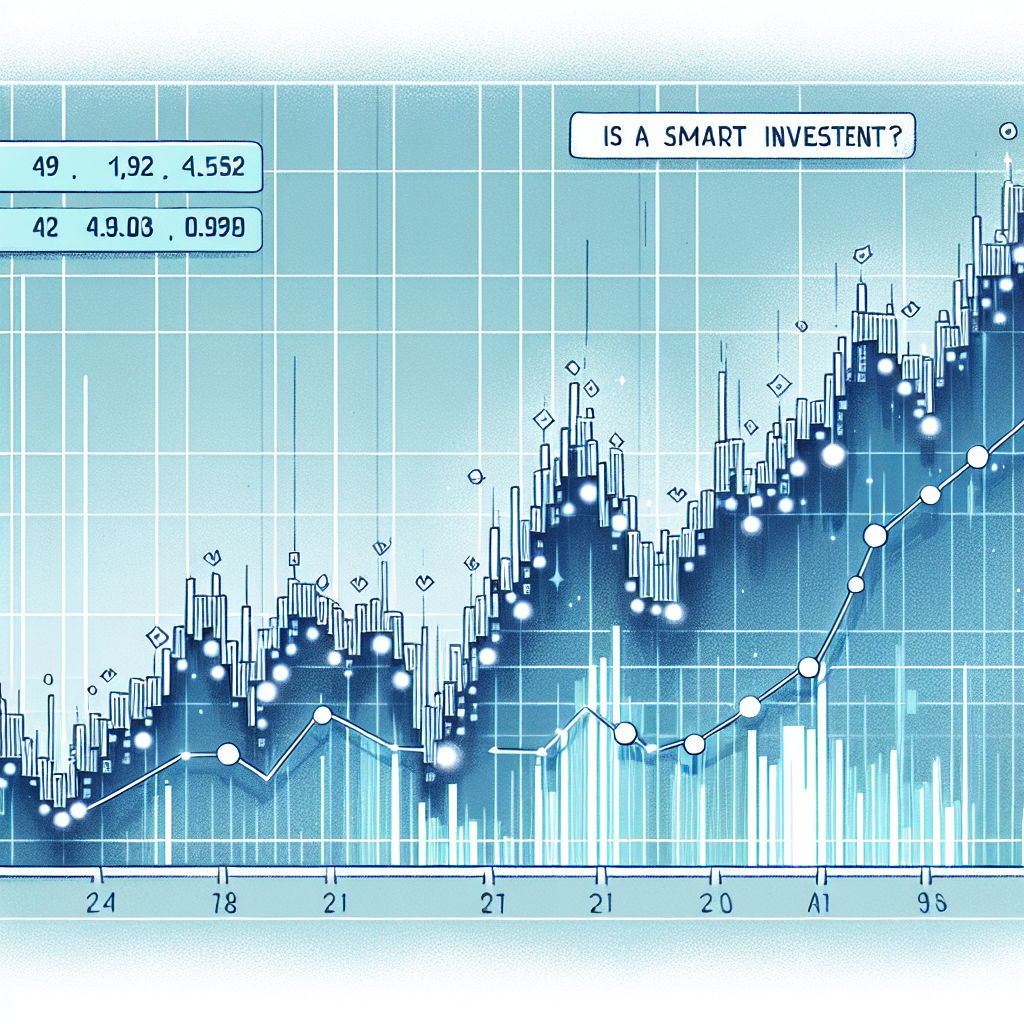“AI Stocks Soar After Trump Win: A Golden Opportunity or Risky Bet?”
Introduction
Following the election of Donald Trump, the stock market witnessed a remarkable surge in artificial intelligence (AI) stocks, capturing the attention of investors worldwide. This unprecedented rise in AI stock value has sparked a debate among financial analysts and investors about the potential long-term benefits and risks associated with investing in this rapidly evolving sector. As AI technology continues to advance and integrate into various industries, the question arises: Is investing in AI stocks a prudent decision, or are we witnessing a speculative bubble driven by post-election market dynamics? This article delves into the factors contributing to the AI stock boom, evaluates the sustainability of this growth, and explores whether AI stocks represent a sound investment opportunity in the current economic climate.
Understanding The Surge: AI Stocks Post-Trump Election
The recent surge in AI stocks following the election of Donald Trump has captured the attention of investors and market analysts alike. This unexpected rise has prompted many to question whether investing in AI stocks is a prudent decision. To understand this phenomenon, it is essential to examine the factors contributing to the surge and assess the potential risks and rewards associated with investing in AI technology.
Firstly, the election of Donald Trump has brought about significant changes in economic policies, which have, in turn, influenced market dynamics. Trump’s administration has been characterized by a focus on deregulation and tax cuts, which have generally been favorable to businesses. This pro-business stance has created an environment conducive to technological innovation and investment, particularly in the AI sector. As companies anticipate a more favorable regulatory landscape, they are increasingly willing to invest in AI technologies, driving up the value of AI stocks.
Moreover, the global demand for AI technology continues to grow at an unprecedented rate. Industries ranging from healthcare to finance are increasingly adopting AI solutions to enhance efficiency, reduce costs, and improve decision-making processes. This widespread adoption is not only boosting the revenues of AI companies but also attracting the attention of investors seeking to capitalize on the technology’s transformative potential. Consequently, the increased demand for AI solutions has contributed to the surge in AI stock prices.
In addition to these factors, the COVID-19 pandemic has accelerated the digital transformation of businesses worldwide. As companies adapt to remote work and digital operations, the reliance on AI technologies has intensified. This shift has further underscored the importance of AI in modern business practices, reinforcing investor confidence in the sector’s long-term growth prospects. The pandemic has thus acted as a catalyst, propelling AI stocks to new heights.
However, while the current surge in AI stocks presents an enticing opportunity, potential investors must also consider the inherent risks. The AI industry is characterized by rapid technological advancements and intense competition. Companies that fail to innovate or adapt to changing market conditions may quickly lose their competitive edge. Additionally, the regulatory environment, although currently favorable, could shift, introducing new challenges for AI companies. Investors must remain vigilant and conduct thorough due diligence before committing to AI stocks.
Furthermore, the valuation of AI stocks has reached unprecedented levels, raising concerns about a potential market bubble. The fear of overvaluation is not unfounded, as history has shown that speculative bubbles can lead to significant market corrections. Investors should be cautious and consider the possibility of volatility in the AI sector, especially given the current economic uncertainties.
In conclusion, the surge in AI stocks following Donald Trump’s election can be attributed to a combination of favorable economic policies, growing global demand for AI technology, and the accelerated digital transformation brought about by the COVID-19 pandemic. While the potential for growth in the AI sector is substantial, investors must also be mindful of the associated risks, including intense competition, regulatory changes, and the possibility of overvaluation. By carefully weighing these factors, investors can make informed decisions about whether AI stocks represent a smart investment in the current market landscape.
Analyzing Market Trends: Why AI Stocks Are Skyrocketing
The recent surge in AI stock prices following the election of Donald Trump has captured the attention of investors and market analysts alike. This phenomenon can be attributed to a confluence of factors that have created a fertile environment for the growth of artificial intelligence companies. To understand why AI stocks are skyrocketing, it is essential to examine the broader market trends and the specific conditions that have contributed to this remarkable rise.
Firstly, the global economy is increasingly driven by technological advancements, with artificial intelligence at the forefront of this transformation. AI technologies are being integrated into various sectors, from healthcare and finance to manufacturing and retail, enhancing efficiency and productivity. This widespread adoption has led to a surge in demand for AI solutions, thereby boosting the stock prices of companies specializing in these technologies. As businesses continue to seek innovative ways to leverage AI, the market for these solutions is expected to expand further, providing a strong foundation for sustained growth in AI stocks.
Moreover, the political landscape following Trump’s election has played a significant role in shaping investor sentiment towards AI stocks. The Trump administration’s policies have often emphasized deregulation and tax cuts, which are generally perceived as favorable for business growth. This pro-business stance has instilled confidence among investors, who anticipate that such policies will create a conducive environment for technology companies to thrive. Consequently, AI stocks have become an attractive investment option for those looking to capitalize on the potential economic benefits of these policies.
In addition to the political and economic factors, the rapid pace of innovation within the AI sector itself cannot be overlooked. Breakthroughs in machine learning, natural language processing, and computer vision have led to the development of more sophisticated and capable AI systems. These advancements have not only expanded the range of applications for AI technologies but have also increased their value proposition to businesses and consumers alike. As a result, companies at the cutting edge of AI research and development are experiencing heightened investor interest, further driving up their stock prices.
However, while the current market trends suggest a promising outlook for AI stocks, potential investors should exercise caution. The volatility inherent in the stock market, coupled with the nascent nature of many AI technologies, means that investing in AI stocks carries a certain level of risk. It is crucial for investors to conduct thorough research and consider the long-term viability of the companies they are interested in. Evaluating factors such as a company’s competitive advantage, its ability to innovate, and its financial health can provide valuable insights into its potential for sustained growth.
Furthermore, it is important to recognize that the AI sector is subject to regulatory scrutiny, particularly concerning issues related to data privacy and ethical considerations. As governments around the world grapple with the implications of AI technologies, regulatory changes could impact the operations and profitability of AI companies. Investors should remain vigilant and stay informed about potential regulatory developments that could affect their investments.
In conclusion, the skyrocketing of AI stocks post-Trump election can be attributed to a combination of technological advancements, favorable political conditions, and growing market demand. While the current trends present lucrative opportunities, investors must carefully assess the risks and conduct due diligence before making investment decisions. By doing so, they can position themselves to potentially benefit from the continued growth and evolution of the AI sector.
Investment Strategies: Capitalizing On AI Stock Growth
The recent surge in AI stock following the election of Donald Trump has captured the attention of investors worldwide, prompting many to consider whether this is a prudent investment opportunity. As the political landscape shifts, so too does the economic environment, creating both challenges and opportunities for those looking to capitalize on market trends. The intersection of politics and technology has always been a fertile ground for speculation, and the current scenario is no exception. With AI technology continuing to evolve at a rapid pace, the potential for growth in this sector appears promising. However, investors must carefully weigh the risks and rewards before making any decisions.
To begin with, the election of Donald Trump has introduced a new set of economic policies that could significantly impact the technology sector. Historically, Trump’s administration has favored deregulation and tax cuts, which could provide a favorable environment for tech companies to thrive. This, in turn, could lead to increased investment in AI research and development, driving innovation and potentially boosting stock prices. Moreover, Trump’s focus on strengthening domestic industries may encourage further investment in AI as a means of enhancing productivity and competitiveness.
Nevertheless, it is essential to consider the inherent volatility of the stock market, particularly in sectors driven by emerging technologies. While AI holds immense potential, it is still a relatively nascent field, and the path to widespread adoption is fraught with uncertainties. Investors must be prepared for fluctuations in stock prices as the market reacts to new developments and adjusts to changing political and economic conditions. Additionally, the competitive nature of the AI industry means that companies must continuously innovate to maintain their edge, which can be both a strength and a vulnerability.
Furthermore, the ethical and regulatory challenges associated with AI cannot be overlooked. As AI systems become more integrated into various aspects of society, concerns about privacy, security, and job displacement are likely to intensify. These issues could lead to increased scrutiny and regulation, potentially impacting the growth trajectory of AI companies. Investors should remain vigilant and consider how these factors might influence the long-term viability of their investments.
In light of these considerations, a diversified investment strategy may be the most prudent approach for those looking to capitalize on the growth of AI stocks. By spreading investments across a range of companies and sectors, investors can mitigate some of the risks associated with market volatility and technological uncertainty. Additionally, keeping abreast of industry trends and developments can provide valuable insights into which companies are best positioned to succeed in this rapidly evolving landscape.
In conclusion, while the post-election surge in AI stock presents an enticing opportunity, it is crucial for investors to approach this market with caution and a well-informed strategy. By carefully evaluating the potential risks and rewards, and by staying informed about political, economic, and technological developments, investors can make more informed decisions about whether AI stocks represent a smart investment. As with any investment, due diligence and a clear understanding of one’s financial goals and risk tolerance are essential components of a successful strategy.
Risks And Rewards: Investing In AI Stocks After The Election

The recent surge in AI stock prices following the election of Donald Trump has captured the attention of investors worldwide, prompting a closer examination of the potential risks and rewards associated with investing in this burgeoning sector. As AI technology continues to evolve and integrate into various industries, the promise of substantial returns has become increasingly enticing. However, it is crucial to approach this investment opportunity with a balanced perspective, considering both the potential benefits and inherent risks.
To begin with, the election of Trump has been perceived by some as a catalyst for economic growth, with expectations of deregulation and tax reforms that could benefit technology companies, including those in the AI sector. This optimistic outlook has contributed to the recent surge in AI stock prices, as investors anticipate a favorable business environment that could accelerate innovation and expansion. Moreover, AI technology is poised to revolutionize industries such as healthcare, finance, and transportation, offering solutions that enhance efficiency and productivity. This transformative potential underscores the attractiveness of AI stocks as a long-term investment.
Nevertheless, while the prospects of AI technology are undeniably promising, it is essential to acknowledge the risks that accompany such investments. One significant concern is the volatility of the stock market, particularly in sectors driven by emerging technologies. AI stocks, like many tech stocks, can experience rapid fluctuations in value, influenced by factors such as technological advancements, regulatory changes, and market sentiment. Consequently, investors must be prepared for potential short-term losses and maintain a long-term perspective to weather these fluctuations.
Furthermore, the competitive landscape of the AI industry presents another layer of risk. As more companies enter the market, the pressure to innovate and differentiate becomes increasingly intense. This competition can lead to significant research and development costs, which may impact profitability in the short term. Investors should carefully evaluate a company’s competitive position, technological capabilities, and strategic vision before committing capital to AI stocks.
In addition to market volatility and competition, regulatory challenges pose a potential risk to AI investments. As AI technology becomes more pervasive, governments worldwide are grappling with the need to establish regulatory frameworks that address ethical concerns, data privacy, and security. These regulations could impact the pace of AI adoption and, consequently, the financial performance of companies in the sector. Investors must stay informed about regulatory developments and consider their potential implications when evaluating AI stocks.
Despite these risks, the rewards of investing in AI stocks can be substantial for those who approach the market with diligence and foresight. Diversification is a key strategy for mitigating risk, allowing investors to spread their exposure across multiple companies and industries within the AI sector. Additionally, conducting thorough research and analysis of individual companies, including their financial health, management team, and growth prospects, can help investors make informed decisions.
In conclusion, while the post-election surge in AI stock prices presents an enticing investment opportunity, it is imperative to weigh the potential risks against the rewards. By maintaining a balanced perspective and employing prudent investment strategies, investors can position themselves to capitalize on the transformative potential of AI technology while navigating the challenges that accompany this dynamic and rapidly evolving sector.
AI Industry Innovations: Driving Stock Prices Up
The recent surge in AI stock prices following the election of Donald Trump has captured the attention of investors and industry analysts alike. This phenomenon can be attributed to a confluence of factors, including advancements in artificial intelligence technology, increased demand for AI-driven solutions, and the political climate’s influence on market dynamics. As we delve into the intricacies of this development, it is essential to understand the underlying innovations within the AI industry that are driving these stock prices upward.
To begin with, the AI industry has witnessed remarkable technological advancements in recent years. Breakthroughs in machine learning, natural language processing, and computer vision have significantly enhanced the capabilities of AI systems. These innovations have enabled businesses to automate complex processes, improve decision-making, and deliver personalized experiences to consumers. Consequently, companies that are at the forefront of AI research and development have seen their stock values rise as investors anticipate continued growth and profitability.
Moreover, the demand for AI-driven solutions has been on an upward trajectory across various sectors. Industries such as healthcare, finance, and retail are increasingly leveraging AI to optimize operations, reduce costs, and enhance customer satisfaction. For instance, in healthcare, AI-powered diagnostic tools are revolutionizing patient care by providing accurate and timely assessments. In finance, AI algorithms are being used to detect fraudulent activities and manage risk more effectively. As these applications become more widespread, the companies providing these AI solutions are experiencing increased investor interest, further driving up their stock prices.
In addition to technological advancements and growing demand, the political climate following Trump’s election has also played a role in the AI stock surge. The administration’s policies, which emphasize deregulation and tax cuts, have created a favorable environment for tech companies to thrive. Investors are optimistic that these policies will lead to increased corporate profits and, by extension, higher stock valuations. Furthermore, the administration’s focus on strengthening national security has led to increased government investment in AI technologies, particularly in areas such as cybersecurity and defense. This influx of funding has bolstered the growth prospects of AI companies, making them more attractive to investors.
However, while the current trends suggest a promising future for AI stocks, potential investors should exercise caution. The rapid pace of innovation in the AI industry means that today’s leading companies could face significant competition from emerging players. Additionally, ethical concerns surrounding AI, such as data privacy and algorithmic bias, could lead to increased regulatory scrutiny, potentially impacting the profitability of AI firms. Therefore, investors must conduct thorough research and consider the long-term implications of their investment decisions.
In conclusion, the post-Trump election surge in AI stock prices can be attributed to a combination of technological advancements, increased demand for AI solutions, and a favorable political climate. While these factors present a compelling case for investment, it is crucial for investors to remain vigilant and consider the potential risks associated with the rapidly evolving AI landscape. By doing so, they can make informed decisions that align with their financial goals and risk tolerance. As the AI industry continues to innovate and expand, it will undoubtedly remain a focal point for investors seeking to capitalize on the transformative potential of artificial intelligence.
Comparing AI Stocks: Which Companies Are Leading The Surge?
The recent surge in AI stocks following the election of Donald Trump has captured the attention of investors worldwide, prompting a closer examination of which companies are leading this remarkable growth. As the political landscape shifts, so too does the economic environment, creating new opportunities and challenges for businesses operating in the artificial intelligence sector. In this context, it is crucial to identify the key players driving the surge in AI stocks and to assess whether these investments are prudent in the current climate.
To begin with, it is essential to recognize the broader market dynamics that have contributed to the rise in AI stock valuations. The election of Trump has brought about a renewed focus on technological innovation and economic growth, with policies aimed at fostering a business-friendly environment. This has, in turn, spurred investor confidence in technology companies, particularly those at the forefront of AI development. As a result, companies that have demonstrated strong capabilities in AI research and application have seen their stock prices soar.
Among the leading companies in this surge is NVIDIA, a powerhouse in the AI industry known for its advanced graphics processing units (GPUs) that are integral to AI computations. NVIDIA’s strategic investments in AI research and its partnerships with major tech firms have positioned it as a leader in the field. The company’s stock has experienced significant growth, reflecting investor optimism about its future prospects. Similarly, Alphabet, the parent company of Google, has been a major player in AI development, with its deep learning and machine learning initiatives driving substantial advancements. Alphabet’s commitment to AI is evident in its diverse portfolio of AI-driven products and services, which continue to capture market share and investor interest.
Another noteworthy contender is Microsoft, which has made significant strides in integrating AI into its suite of products and services. Through its Azure cloud platform, Microsoft has provided businesses with powerful AI tools, enhancing its competitive edge in the market. The company’s strategic acquisitions and partnerships have further solidified its position as a leader in AI technology. Additionally, Amazon, with its AI-powered services such as Alexa and AWS, has demonstrated its ability to leverage AI to enhance customer experiences and streamline operations, contributing to its stock’s upward trajectory.
While these companies are at the forefront of the AI stock surge, it is important to consider the potential risks associated with investing in this sector. The rapid pace of technological advancement means that companies must continuously innovate to maintain their competitive advantage. Furthermore, regulatory challenges and ethical considerations surrounding AI development could impact the industry’s growth trajectory. Investors must weigh these factors carefully when considering AI stocks as part of their portfolio.
In conclusion, the post-Trump election surge in AI stocks has highlighted the potential of artificial intelligence as a transformative force in the global economy. Companies like NVIDIA, Alphabet, Microsoft, and Amazon are leading the charge, demonstrating strong capabilities and strategic foresight in AI development. However, as with any investment, it is crucial to conduct thorough research and consider the inherent risks before committing capital. By doing so, investors can make informed decisions about whether AI stocks represent a smart investment in the current economic landscape.
Long-Term Outlook: Is AI A Sustainable Investment Post-Election?
The recent surge in AI stock following the election of Donald Trump has captured the attention of investors worldwide, prompting a closer examination of its long-term viability as a sustainable investment. As the political landscape shifts, so too does the economic environment, influencing market trends and investor sentiment. The election of a president known for his business acumen and deregulation policies has instilled confidence in certain sectors, particularly technology. However, the question remains: is investing in AI a prudent decision for the long haul?
To begin with, the AI industry has been on an upward trajectory for several years, driven by advancements in machine learning, data analytics, and automation. These technologies have permeated various sectors, from healthcare to finance, offering innovative solutions and improving efficiency. The election of Trump, with his pro-business stance, has further fueled optimism in the tech sector, as investors anticipate favorable policies that could bolster growth. This optimism is reflected in the recent spike in AI stock prices, suggesting a positive short-term outlook.
Nevertheless, while the immediate post-election environment appears promising, it is crucial to consider the broader implications of investing in AI. One must acknowledge the inherent volatility of the stock market, particularly in sectors driven by rapid technological advancements. The AI industry, despite its potential, is not immune to fluctuations and uncertainties. Factors such as regulatory changes, ethical concerns, and competitive pressures could impact the industry’s trajectory. Therefore, investors must weigh these risks against the potential rewards when considering AI as a long-term investment.
Moreover, the sustainability of AI as an investment hinges on its ability to adapt and evolve. The technology landscape is ever-changing, and companies that fail to innovate may find themselves at a disadvantage. Consequently, investors should focus on firms with a proven track record of research and development, as well as those that demonstrate a commitment to ethical AI practices. By doing so, they can mitigate some of the risks associated with investing in a rapidly evolving industry.
In addition to company-specific factors, macroeconomic conditions also play a significant role in determining the sustainability of AI investments. The global economy is currently navigating a complex web of challenges, including geopolitical tensions, supply chain disruptions, and inflationary pressures. These factors can influence investor confidence and, by extension, the performance of AI stocks. Therefore, a comprehensive understanding of the economic landscape is essential for making informed investment decisions.
Furthermore, the societal impact of AI cannot be overlooked when assessing its long-term investment potential. As AI technologies become more integrated into daily life, concerns about job displacement, privacy, and ethical use are likely to intensify. Companies that proactively address these issues and engage in responsible AI development may be better positioned to sustain growth and maintain investor confidence.
In conclusion, while the post-election surge in AI stock presents an enticing opportunity, it is imperative for investors to adopt a cautious and informed approach. By considering the industry’s inherent risks, the importance of innovation, macroeconomic factors, and societal implications, investors can better assess the sustainability of AI as a long-term investment. As with any investment, due diligence and a clear understanding of the market dynamics are essential to making sound financial decisions.
Q&A
1. **What caused AI stocks to skyrocket post-Trump election?**
The surge in AI stocks post-Trump election was driven by market optimism about deregulation, tax cuts, and increased technology investments.
2. **Which AI companies saw significant stock increases?**
Companies like NVIDIA, Alphabet (Google), and Microsoft experienced notable stock increases due to their strong AI portfolios.
3. **What are the potential risks of investing in AI stocks?**
Risks include market volatility, overvaluation, regulatory changes, and rapid technological advancements that could disrupt current leaders.
4. **How did Trump’s policies impact AI investments?**
Trump’s policies, such as tax reforms and deregulation, were perceived to favor tech companies, encouraging more investments in AI.
5. **Is the AI stock surge sustainable in the long term?**
Sustainability depends on continued innovation, market demand, and the ability of companies to monetize AI technologies effectively.
6. **What should investors consider before investing in AI stocks?**
Investors should consider company fundamentals, market trends, competitive landscape, and potential regulatory impacts.
7. **Are there alternative ways to invest in AI besides direct stock purchases?**
Alternatives include AI-focused ETFs, mutual funds, or investing in companies that heavily utilize AI in their operations.
Conclusion
The surge in AI stock following Trump’s election can be attributed to market optimism about potential policy changes favoring technology and business growth. However, while the initial spike may present lucrative short-term gains, investors should exercise caution. The long-term viability of AI stocks depends on factors such as regulatory developments, technological advancements, and market competition. Therefore, while AI stocks may be a smart investment for those with a high-risk tolerance and a keen eye on market trends, a diversified portfolio and thorough research are essential to mitigate potential risks.





